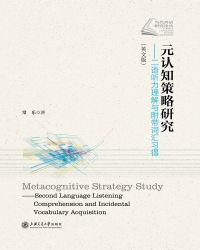1.3.3 Metacognitive Listening Awareness
您可以在百度里搜索“元认知策略研究:二语听力理解与附带词汇习得(英文版) 艾草文学(www.321553.xyz)”查找最新章节!
1.3.3 Metacognitive Listening Awareness
The concept of metacognition was introduced in cognitive psychology by Flavell (1979), who defined metacognition as “knowledge that takes as its object or regulates any aspect of any cognitive behavior” (Flavell, 1979, p.8). He then described metacognition as awareness of how one learns, awareness of when one does and does not understand, knowledge of how to use available information to achieve a goal, ability to judge the cognitive demands of a particular task, knowledge of what strategies to use for what purposes, and assessment of one's progress both during and after performance. Metacognitive awareness involves both experience and knowledge (Flavell, 1979). Metacognitive experience is a feeling we have about our cognition, while metacognitive knowledge consists of our beliefs and knowledge about learning.
Since Wenden (1987) first drew public attention to the enormous potential that metacognition has for understanding L2 learning, L2 researchers (e. g., Goh, 2008; Vandergrift, 2004) have proposed specific metacognitive approaches to help learners raise their metacognitive awareness about listening and integrate the use of strategies while listening. Research on the effects of metacognitive instruction has also provided some evidence that performance, confidence, and motivation can be enhanced through classroom instruction (e. g., Goh, 2002b; Vandergrift & Tafaghodtari, 2010).
Based on Flavell's (1979) theoretical model of metacognition, Vandergrift, Goh, Mareschal, and Tafaghodtari (2006) classified metacognitive listening awareness into five categories: problem solving, planning-evaluation, mental translation, person knowledge and directed attention. To help learners integrate the use of metacognitive strategies while listening, Vandergrift (2004) proposed a cycle which includes such metacognitive processes as prompting learners to use strategies to regulate their comprehension, verifying the strategies being used, and evaluating the strategies used in the listening process. Such metacognitive processes not only raise the learners' metacognitive awareness about their strategy use but also offer much needed scaffolding while learners are working with listening texts. “Learners who successfully use these strategies to improve their comprehension will also experience an increase in motivation” (Goh, 2008, p.192). 元认知策略研究:二语听力理解与附带词汇习得(英文版)
